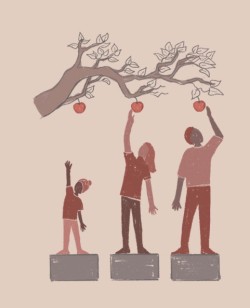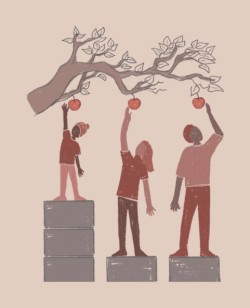What does being treated unfairly mean?
Unfairness is a form of discrimination where people are:
- treated less favourably than others in a similar situation
- disadvantaged by being treated the same as others when their circumstances are different.
For example, someone with a learning disability being given the same information as everyone else about a service and not being able to understand it. This disadvantages them because they might miss out on the service.
Treating people differently by giving them accessible information, levels the playing field, and gives them the same access to that service. This is called equity.

Equality
Equality means each individual or group of people is given the same resources or opportunities.
Equity
Equity recognises that each person has different circumstances and allocates the exact resources and opportunities needed to reach an equal outcome.
Women with learning disabilities frequently experience multiple forms of discrimination, or unfairness, throughout their lives. This includes being treated unfairly when accessing support for gender-based violence, resulting in prolonged complex trauma, and harm, that is unnecessary, unjust and avoidable.
People with learning disabilities describe unfairness in relation to gender-based violence as:
Being treated differently:
“We definitely get treated differently, they don’t take us as seriously and we don’t get as much help. People look upon us as vulnerable, so they think we need to get treated differently.”
– Member of People First (Scotland)’s Equally Safe Group, 2024
Being treated with disrespect:
“To be so quickly invalidated … and dismissed … that hit me very hard … that triggered a lot of stuff for me, and I did start to become more mentally ill, after that I went massively downhill.”
– Person with a learning disability, Hutchison, 2024a
The presence of discrimination and prejudice:
“That’s a bit upsetting to me when I’ve already explained I can’t do these phone calls. And they’re just like ’just call them’, that’s basically like telling someone in the wheelchair ‘just walk’ to me. Well, you wouldn’t say that would you? It’s just frustrating and upsetting.”
– Person with a learning disability, Hutchison, 2024a